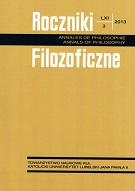Logika teologii objawionej w pismach Alberta Wielkiego i Tomasza z Akwinu
The Logic of Revealed Theology in the Works of Albert the Great and Thomas Aquinas
Author(s): Marcin TrepczyńskiSubject(s): Philosophy
Published by: Towarzystwo Naukowe KUL & Katolicki Uniwersytet Lubelski Jana Pawła II
Keywords: Albert the Great; Thomas Aquinas; revealed theology; axiomatic deductive system; non-monotonical logic; negative theology; Albert Wielki; Tomasz z Akwinu; teologia objawiona; aksjomatyczny system dedukcyjny; logika niemonotoniczna; teologia negatywna
Summary/Abstract: In this paper the Author presents some remarks and hypotheses concerning the logic of revealed theology according to approach of Saint Albert the Great anf Saint Thomas Aquinas. First of all He shows that in their opinion revealed theology uses logic (as a science of correct reasonings). He also discusses the problem of scientific status of revealed theology on the grounds of the most important methodological fragments from their summas of theology; in this light he analyses if the revealed theology in their view may be interpreted as a kind of axiomatic deductive system. The Autor inclines to give a positive answer on this question and presents a couple of arguments for such a hypothesis, however he is aware that the point is not totally clear and—hence—open for discussion. The next topic is a question if we can admit that Thomas adopts one of non-monotonic logic (understood here as relation of inference or relation of consequence) in some reasonings chich we find in his Summa Theologiae. The Author gives a positive answer and confronts his opinion with an opinion of his opponent. In the third set of remarks he wonders if we may adopt that Aquinas accepts some local modifications in logic (this time understood as a some general rules of thinking), such as “the logic of Trinity” or “the Christologic”. Finally the Author invokes a case of the logic of negative theology and a nature of negation adopted according to this approach. However these remarks presented in this article concern the works of Albert and Thomas, the Author tends to affirm that their approach to the Catholic revealed theology is a proper one and—in this light—these conclusions may be valid for contemporary theology.
Journal: Roczniki Filozoficzne
- Issue Year: 61/2013
- Issue No: 3
- Page Range: 61-76
- Page Count: 16
- Language: Polish

